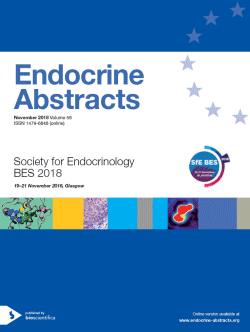Searchable abstracts of presentations at key conferences in endocrinology

Society for Endocrinology BES 2018
Glasgow,
UK
19 Nov 2018 - 21 Nov 2018

The Society for Endocrinology BES will take place 19-21 Nov 2018 in Glasgow. Come and exchange knowledge, share experiences and strengthen collaborations across our global community of endocrinologists.
Symposia
Breast cancer
ea0059s5.1 | Breast cancer | SFEBES2018
Diving into the dark matter of the breast cancer genome
Recent years have seen an increasing effort to decode the cancer genome. Most of the studies have focused on the coding genome to identify cancer driver genes. My group is interested in the role of the non-coding genome and its potential contribution to the drive transcriptional aberrations in breast cancer patients. To do so we use a wide-spectrum of techniques including genomic, epigenomics in patient-derived samples. I will present the results of a couple of studies in whic...
ea0059s5.2 | Breast cancer | SFEBES2018
Metabolic pathways regulating breast cancer in obesity
Obesity is associated with an increased risk of hormone receptor positive breast cancer after menopause. The aromatase enzyme catalyzes the conversion of androgens into oestrogens and the breast adipose-specific expression of aromatase is hypothesized to be a major driver of breast cancer growth when ovarian oestrogen biosynthesis has ceased. We have found that aromatase is elevated in breast adipose stromal cells in relation to obesity and menopausal status. Furthermore, obes...
ea0059s5.3 | Breast cancer | SFEBES2018
The Estrogen Receptor chromatin binding landscape in human tumors
Joosten Stacey , Severson Tesa , Kim Yongsoo , Schuurman Karianne , van Diest Paul , Wessels Lodewyk , Zwart Wilbert
Estrogen Receptor alpha (ER) is the key driver in the majority of all breast cancers, and considered the main target for therapy. However, resistance to treatment is common and biomarkers to facilitate optimal treatment selection are urgently needed. Even though the vast majority of breast cancer patients are female, breast cancer can develop in men as well. Using chromatin immunoprecipitation followed by massive-parallel sequencing (ChIP-seq), we identified the genome-wide ch...



